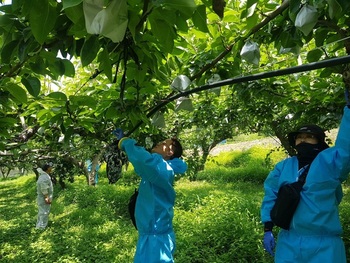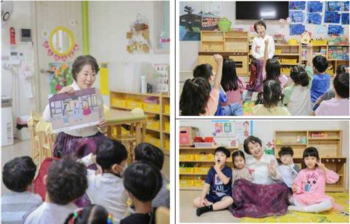|
Translated into Korean by Y. T. Kim
[제1장/3회] *3-3 단락
After the horses came Muriel the white goat, and Benjamin the donkey. Benjamin was the oldest animal on the farm, and the worst tempered1. He seldom2 talked and when he did, it was usually to make some cynical3 remark – for instance, he would say that God had given him a tail to keep the flies off, but that he would sooner3 have no tail and no flies. Alone among the animals on the farm he never laughed. *If asked why, he would say that he saw nothing to laugh at. Nevertheless, without openly admitting4 it, he was devoted5 to Boxer, the two of them usually spent their Sundays together in the small paddock beyond the orchard, grazing6 side by side and never speaking.
말 다음으로 흰 염소 뮤리엘과 당나귀 벤자민이 왔다. 벤자민은 존슨 농장에서 나이가 가장 많고 성질도 제일 고약한 동물이었다. 그는 말을 잘 하지 않았고, 입을 열더라도 냉소적인 발언 밖에 나오지 않았다. 예를 들면, 하느님은 파리를 쫓으라고 자기에게 꼬리를 달아 주었지만, 애당초 꼬리도 파리도 없었으면 좋았을 거라고 말한다. 농장의 동물들 중에 유독 벤저민만 웃지 않았다. 왜 그러느냐고 물으면 그는 웃을 일이 없어서라고 대답한다. 그런데도, 벤저민 스스로 인정하진 않지만, 복서에겐 시간을 내주곤 했다. 둘은 일요일마다 과수원 너머에 있는 작은 목장에서 말없이 나란히 풀을 뜯어 함께 시간을 보냈다.
1. bad tempered : (관) “성질이 고약한” (형용사 최상급 유의) - 명사형으로도 일상생활에서 불쾌한 기분을 표현할 때 자주 등장 예) ‘Benjamin has such a bad temper.’ (“벤저민은 성격이 너무 고약해요.”) 2. seldom : (부) “좀처럼..” “거의 없는” - ‘hardly (ever)’, ‘almost never’와 사실상 같은 의미 3. cynical : (형) “냉소적인”, “부정적인” - 냉소적인 사람을 ‘cynic’이라고 표현할 수 있다. 4. sooner : (부) “차라리” - 사실상 ‘rather’와 같이 활용할 수 있습니다. - ‘I would sooner be taller than prettier.’ (“예쁜 것보다 키가 크는 게 나을 거 같다.”) 5. devoted : (형) 헌신적인 (동사: ‘devote’ : “봉사하다”, “헌신 하다”, “바치다”) 6. graze : (동) “풀을 뜯다”, (소, 양 등) “방목하다” * If asked why --> If he was asked why he never laughed 왜 절대 웃지 않냐고 그에게 물으면
* 4 단락
The two horses had just lain down when a brood1 of ducklings, which had lost their mother, filed2 into the barn, cheeping feebly3 and wandering from side to side to find a place where they would not be trodden4 on. Clover made a sort of5 wall round them with her great foreleg6, and the ducklings nestled down inside it and promptly7 fell asleep. At the last moment, Mollie, the foolish, pretty white mare who drew Mr. Jones’ trap came mincing8 daintily9 in, chewing at a lump of sugar. She took a place near the front and began flirting10 her white mane, hoping to draw11 the attention to the red ribbons it was plaited with. Last of all came the cat, who looked round, as usual, for the warmest place, and finally squeezed herself in between Boxer and Clover; there she purred contentedly12 throughout Major’s speech without listening to a word of what he was saying.
두 말이 자리를 잡자, 어미를 여윈 오리 새끼 떼가 헛간으로 줄지어 들어왔다. 가냘프게 꽥꽥거리면서 다른 동물에게 밟히지 않을 자리를 찾느라 우왕좌왕했다. 클로버가 그 커다란 앞다리로 그들 주변에 벽처럼 두르자, 오리 새끼들은 그 안에 자리 잡고 금세 잠들었다. 끝으로 존스 씨의 마차를 끄는, 멍청하지만 예쁘장한 흰 암말 몰리가 설탕 덩어리를 우아하게 씹으면서 들어왔다. 몰리는 맨 앞줄 가까이에 자리를 잡고 갈기를 과시하기 시작했다. 머리를 땋은 붉은 리본에 시선을 끌어드리려는 의도였다. 맨 마지막으로 고양이가 들어와 늘 그랬듯 가장 따뜻한 자리를 찾아 여기저기 둘러보더니 마침내 복서와 클로버 사이로 비집고 들어갔다. 메이저의 연설 내내 그가 하는 말 한마디도 듣지 않으면서 기분 좋다고 가르랑거렸다.
1. brood : (명) “새끼들” 2. file : (동) “줄지어 들어오다” - ‘Please wait in single file.’ (“한 줄로 기다려 주세요!”) 3. feebly : (부) 약하게, 힘없이 (형: ‘Feeble’) 4. trodden : (동/’tread’ 과거분사, 과거형은 'trode') “밟히다” 5. sort of : (관) “일종의~”, “~과 같은” - ‘kind of’와 같이 활용 가능. 6. foreleg :(명/짐승, 곤충, 의자의 ‘앞다리’) 7. promptly : (부) “바로”, “제시간에”, “시간을 지키며” - 시간을 지킨다는 의미에서 동의어로 ‘punctually’가 있다. 8. mince : (동) (부자연스럽게, 고상한 척하며) “짧게 빠른 걸음을 걷다” - 고기 등을 “간다”라는 뜻으로 흔히 사용. 9. daintily : (부) “섬세하게”, “우아하게” 10. flirt : (동) “쫑긋쫑긋 움직이다”, “농탕치다”, “농락하다” 11 draw : (동) “끌어당기다”, “뽑아내다” 예) ‘I don’t want to draw too much attention.’ (“너무 주목받고 싶지 않아.”) ‘Draw your sword!’ (“칼을 뽑아라.!”) 12. Contentedly : (부) “흐뭇하여”, “만족한 듯” <저작권자 ⓒ 소방옴부즈뉴스 무단전재 및 재배포 금지>
댓글
동물농장 관련기사목록
|
문화샘터 많이 본 기사
|



 1장 3회
1장 3회














